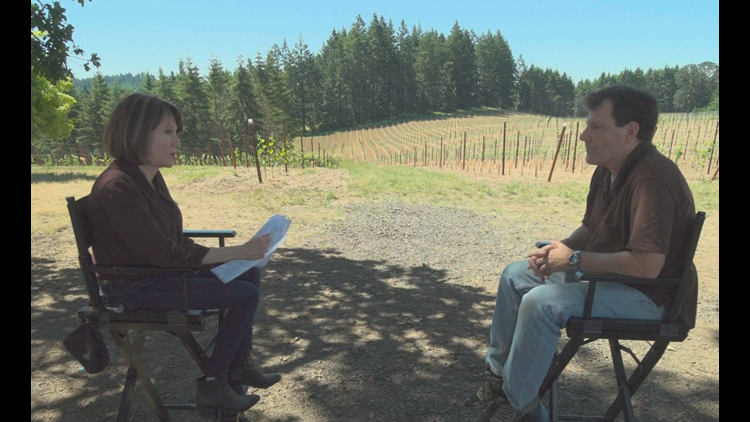YAMHILL, Ore. — Two-time Pulitzer Prize winner and New York Times columnist Nicholas Kristof writes about human rights, women's rights, and global affairs. He also has a unique perspective on his home state of Oregon and in Portland.
In this episode of Straight Talk, Laural Porter went to Kristof Family Farms in Yamhill to talk to Kristof about his views of Portland, city leadership, and what he thinks the city needs to do to rebound.
Kristof grew up on a sheep and cherry farm in rural Yamhill, Oregon, and visited Portland often and took classes in high school at Portland State. He says he loved Portland and its quirkiness and has always been proud of the city.
"I watched as Portland came out of the 70s and became, really, an amazing city the whole country really admired,” Kristof said.
But for much of the nation, that image of Portland has changed.
"In 1992, The Atlantic Monthly did an article, a glowing portrait of Portland," he said. "Sadly, you won't see such an article written about Portland today."
"Lessons for America from a Weird Portland"
In a recent column, "Lessons for America from a Weird Portland," Kristof wrote that he's been pained to see Portland portrayed as a war zone or dying city, and Portland's problems offer "lessons for the rest of the country about the uses and abuses of progressivism."
Kristof called the city's problems of homelessness, trash, ongoing vandalism and destruction and a record number of homicides a "failure of leadership."
"I think they are well-meaning and are balancing different constituencies, but city leadership is about delivering a better quality of life," he said. "When you can't pick up garbage, when you can't keep people safe, when you can't provide affordable housing, that is not delivering a quality way of life."
Kristof called it a blemish on Portland and the entire state of Oregon.
"I think we have a wonderful city that screwed up to some degree," Kristof said.
On Mayor Ted Wheeler's handling of protests
Kristof said Portland mayor Ted Wheeler found himself in a no-win situation in his handling of the protests as he took criticism from both the left and the right, but still had harsh words for how the mayor addressed the months of nightly, often destructive protests.
"The point of having a leader is you have someone who is willing to piss people off, who can offend people, who can make hard decisions," said Kristof. "That's what Tom McCall did... I sympathize with Ted Wheeler. He was in an impossible situation, but he did sometimes look like a deer in the headlights in that impossible situation."
Kristof said Wheeler should have moved much more quickly last summer to reestablish order, especially after the federal forces sent by President Trump left the city.
The way forward
Kristof said filing his twice-weekly New York Times columns from his family's Yamhill farm gives him a window into the people left behind, and the struggles of the state, and of the city of Portland.
He had this wish for the state's future.
"At the end of the day, what has made Oregon work is a practical, empirical approach to solving problems, and I think that is going to start with acknowledging the stakes, acknowledging weaknesses in the context of the glories of this state. I think that's the way forward and that's the Oregon way forward," he said.
Future of Kristof Family Farms
WATCH: While on the Kristof farm, Laural also got a tour of the newly planted cider apple orchard.
The Kristofs replaced their cherry orchard with cider apple trees and grape vines. They're partnering with a local cidery and winery to release hard cider, pinot noir, and chardonnay in the near future. Kristof talked about his love for Oregon and his dream for the future of the Kristof Family Farms.
Straight Talk airs Friday at 7 p.m., Saturday and Sunday at 8:30 p.m., and Monday at 4:30 a.m.



